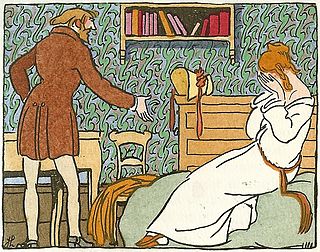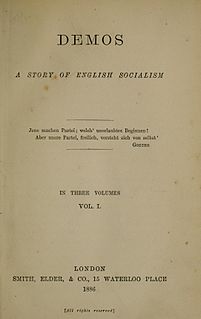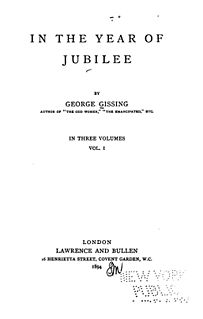
Sir Anthony Hope Hawkins, better known as Anthony Hope, was a British novelist and playwright. He was a prolific writer, especially of adventure novels but he is remembered predominantly for only two books: The Prisoner of Zenda (1894) and its sequel Rupert of Hentzau (1898). These works, "minor classics" of English literature, are set in the contemporaneous fictional country of Ruritania and spawned the genre known as Ruritanian romance, books set in fictional European locales similar to the novels. Zenda has inspired many adaptations, most notably the 1937 Hollywood movie of the same name and the 1952 version.

Lorna Doone: A Romance of Exmoor is a novel by English author Richard Doddridge Blackmore, published in 1869. It is a romance based on a group of historical characters and set in the late 17th century in Devon and Somerset, particularly around the East Lyn Valley area of Exmoor. In 2003, the novel was listed on the BBC's survey The Big Read.

George Meredith was an English novelist and poet of the Victorian era. At first his focus was poetry, influenced by John Keats among others, but he gradually established a reputation as a novelist. The Ordeal of Richard Feverel (1859) briefly scandalized Victorian literary circles. Of his later novels, the most enduring is The Egoist (1879), though in his lifetime his greatest success was Diana of the Crossways (1885). His novels were innovative in their attention to characters' psychology, and also took a close interest in social change. His style, in both poetry and prose, was noted for its syntactic complexity; Oscar Wilde likened it to "chaos illumined by brilliant flashes of lightning". He was an encourager of other novelists, as well as an influence on them; among those to benefit were Robert Louis Stevenson and George Gissing. He was nominated for the Nobel Prize in Literature seven times.

George Robert Gissing was an English novelist, who published 23 novels between 1880 and 1903. His best-known works have reappeared in modern editions. They include The Nether World (1889), New Grub Street (1891) and The Odd Women (1893).

William Henry Hudson – known in Argentina as Guillermo Enrique Hudson – was an Anglo-Argentine author, naturalist and ornithologist.

A Clergyman's Daughter is a 1935 novel by English author George Orwell. It tells the story of Dorothy Hare, the clergyman's daughter of the title, whose life is turned upside down when she suffers an attack of amnesia. It is Orwell's most formally experimental novel, featuring a chapter written entirely in dramatic form, but he was never satisfied with it and he left instructions that after his death it was not to be reprinted. Despite these instructions, Orwell did consent to the printing of cheap editions "of any book which may bring in a few pounds for my heirs" following his death.

John Forster was an important Victorian English biographer and literary critic.

John Davidson was a Scottish poet, playwright and novelist, best known for his ballads. He also did translations from French and German. In 1909, financial difficulties, as well as physical and mental health problems, led to his suicide.

New Grub Street is a novel by George Gissing published in 1891, which is set in the literary and journalistic circles of 1880s London. Gissing revised and shortened the novel for a French edition of 1901.

Scenes of Bohemian Life is a work by Henri Murger, published in 1851. Although it is commonly called a novel, it does not follow standard novel form. Rather, it is a collection of loosely related stories, all set in the Latin Quarter of Paris in the 1840s, romanticizing bohemian life in a playful way. Most of the stories were originally published individually in a local literary magazine, Le Corsaire. Many of them were semi-autobiographical, featuring characters based on actual individuals who would have been familiar to some of the magazine's readers.

Morley Roberts was an English novelist and short story writer, best known for The Private Life of Henry Maitland.

The Odd Women is an 1893 novel by the English novelist George Gissing. Its themes are the role of women in society, marriage, morals and the early feminist movement.
Eve's Ransom is a novel by George Gissing, first published in 1895 as a serialisation in the Illustrated London News. It features the story of a mechanical draughtsman named Maurice Hilliard, who comes into some money, which enables him to live without working. As part of his resulting travels, he meets and falls in love with Eve Madeley, a book keeper.

Workers in the Dawn is a novel by George Gissing, which was originally published in three volumes in 1880. It was the first of Gissing's published novels, although he had been working on another prior to this. The work focuses on the unhappy marriage of Arthur Golding, a rising artist from a poor background, and Carrie Mitchell, a prostitute. This plot was partly based on Gissing's negative experiences of marriage to his first wife. It also was designed to serve the function of political polemic, highlighting social issues that Gissing felt strongly about. Reviews of the novel generally recognised some potential in the author, but were critical of Workers in the Dawn. After reading the first known published review in the Athenaeum, Gissing was driven to describe critics as "unprincipled vagabonds".

Demos: A Story of English Socialism is a novel by the English author George Gissing. It was written between late 1885 and March 1886 and first published in April 1886 by Smith, Elder & Co.
The Gissing family of Great Britain included several noted writers, Olympic competitors, and teachers.
Charles Francis Keary was an English scholar and historian. His later work as a novelist influenced the modernist writer James Joyce. However, the English novelist George Gissing read four of Keary's works, including three novels, in the first 31 days of 1896, and found the novel Herbert Vanlennert, "a long, conscientious, uninspired book".

Veranilda: A Romance is a posthumous novel by English author George Gissing. The book was left incomplete at the time of Gissing's death and it was first published in 1904 by Archibald Constable and Company.

In the Year of Jubilee is the thirteenth novel by English author George Gissing. First published in 1894.

Denzil Quarrier is a novel written by the English author George Gissing, which was originally published in February 1892.

















